#other's stories. because that's the crux of it isn't it? there will be no book written about one of them without mentioning the other.
Photo

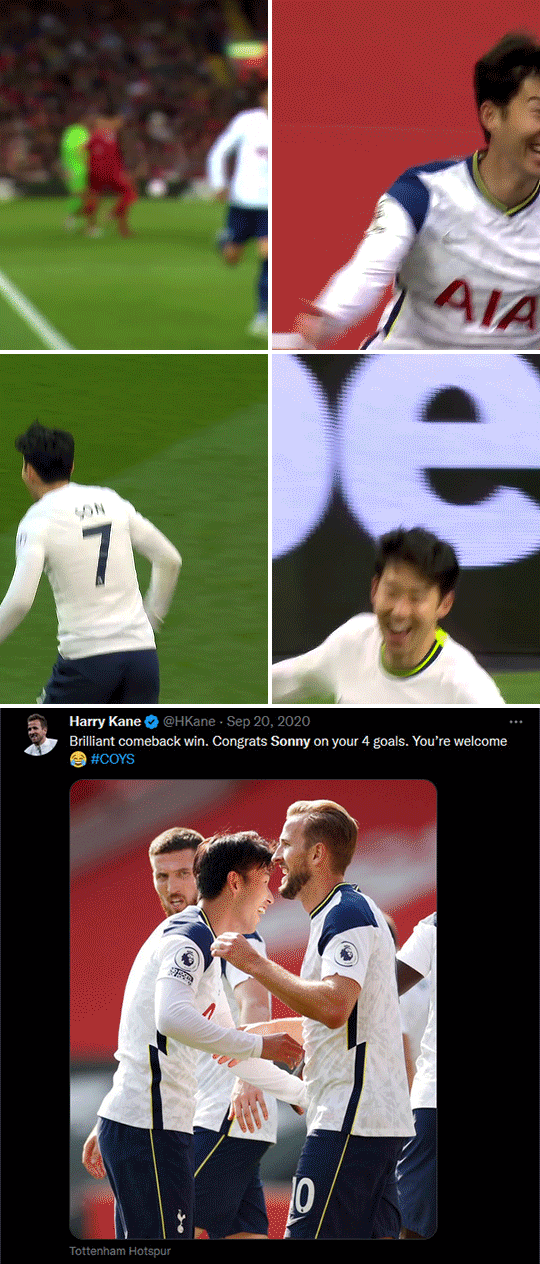





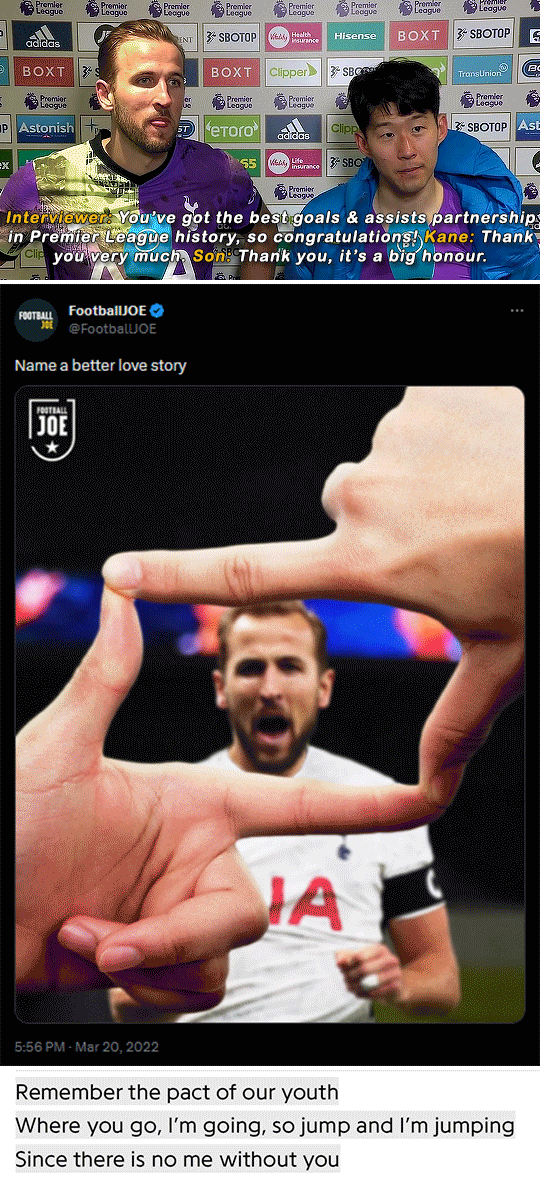
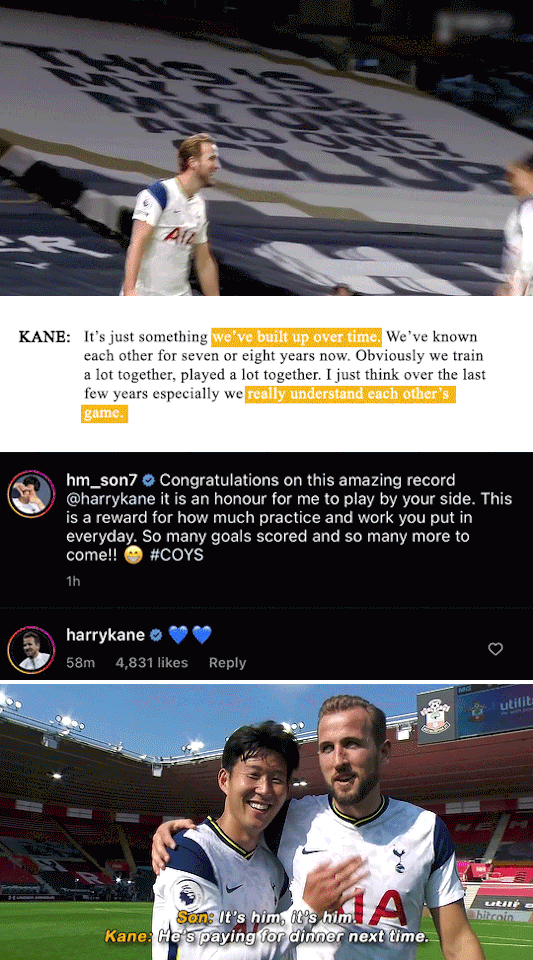

HARRY KANE (10) & SON HEUNGMIN (7)
OF TOTTENHAM HOTSPUR
The greatest partnership to ever exist in the world of football.
“When you turn, I will be always there.”
BBC Sport / Kane and Son break the all-time record for Premier League goal combinations / The Guardian / Kane-Son trademark celebration during Liverpool 1-1 Tottenham, 07th May 2022 / Kane-Son trademark celebration during Manchester United 1-6 Tottenham, 04th October 2020 / Kane-Son trademark celebration during Aston Villa 0-4 Tottenham, 09th April 2022 / Kane-Son trademark celebration during Tottenham 2-0 West Ham United / Kane on Twitter after assisting Son on 4 goals against Southampton / Tottenham 1-0 Burnley, 26th Oct 2020 / Nice to Mich You, Son Heungmin / Premier League / Kane and Son hug during Manchester City 2-3 Tottenham, 19th Feb 2022 / Kane and Son hug during Tottenham 1-0 Crystal Palace, 20th Sept 2015 / Kane consoles Son during the Carabao Cup final against Manchester City / Kane and Son celebrate during Tottenham 5-2 Southampton, 26th Dec 2017 / Commentator on the Kane and Son partnership / Tottenham 2-0 Arsenal, 06th Dec 2020 / Caption from ‘Heungmin Son and Harry Kane guess their Premier League goal combinations’ / Stray Kids, I am YOU / Kane and Son celebrate during a 6-1 game against Leicester City, 18th May 2017 / Kane and Son celebrate during a 4-0 game against Everton, 13th Jan 2018 / Kane on Twitter / Frank O’Hara, ‘Morning’ / Kane wins the Golden Boot 20/21 / Son wins the Golden Boot 21/22 / Kane assists Son against Southampton / Caption from ‘Heungmin Son and Harry Kane guess their Premier League goal combinations’ / Mitski, Francis Forever / YouTube: Record breakers! Kane & Son react to becoming Premier League’s most deadly duo! / FootballJOE on Twitter, referencing Son’s trademark goal celebration, the ‘camera,’ through which he is looking at Kane / Gang of Youths, ‘Achilles Come Down’ / Kane and Son celebrate their goal against Arsenal / Kane on his relationship and link-ups with Son / Son and Kane on Instagram / Kane and Son after Kane assisted Son on four goals against Southampton / Tottenham 3-2 Ajax, 08th May 2019 / cr. Shaun Botterill, Getty Images / Commentator on the Kane and Son partnership / Tottenham 3-2 Manchester City, 19th Feb 2022 / Caption from ‘Heungmin Son and Harry Kane guess their Premier League goal combinations’
#footballedit#kaneson#tottenham hotspur#harry kane#son heungmin#son heung min#heungmin son#heung min son#tottenham#football#this is my magnum opus i spent an actual insane amount of time on this ... there is something SO deeply wrong with me.#i feel like this isn't enough to encompass the love they have for each other there needs to be MORE ... but i tried my best#in the end do you ever think about how they both grew up on different sides of the world with nothing binding them apart from a shared#desire to play football and to be the best at it. and how more than 2 decades later they found each other in london and became part of each#other's stories. because that's the crux of it isn't it? there will be no book written about one of them without mentioning the other.#they've become so intertwined over the years you can't tell where one starts and the other ends.#the amount of respect and admiration that they hold for each other is actually insane. like sonny talking about how harry is the best#striker in the world and - not pictured here - how he believed he could win the golden boot at the world cup last year which uh.#that was never going to happen but it's the FAITH. the unwavering relentless FAITH!!! that he has in him :(((#or the DIFFERENT way harry loves sonny oh i could pen tomes about it really but the point is that he opens up around him and he sheds that#stoic and untouchable persona and actually laughs and giggles and smiles in interviews with him and never doubts him. ever.#i couldn't fit in 'never in doubt' here but NEVER IN DOUBT!!!#'when you turn i will be always there.' how goddamn romantic is that then.#the thing is that they were born to be together. they were meant to play with each other.#there will never be another duo like them.#rahul.gif
546 notes
·
View notes
Text
Since I've spent the last month-plus neck-deep in queer Christian history research, I ended up with some thoughts™️ about "classical" Western homoeroticism vs. Christian homophobia.
Liberal Christian apologetics sometimes do a very annoying thing when asked to explain the homophobia in the New Testament epistles. Because it's real, it's there, and homophobic Christians take it as the Unquestionable Word of God. So obviously we have to do something about it.
The liberal explanation tends to go something like this: "the epistle writer is talking about the abusive and exploitative homosexual acts that were common in ancient Rome, not the loving/egalitarian/mutually respectful relationships that gay people are able to have today." And it's so frustrating because there is SOME truth in this. We and Paul both know that the Greeks and Romans were notorious pederasts and slave-abusers. And that's bad! It's super bad. I do agree that Paul/the epistle writer is condemning abusive behavior using language and frameworks that would have been available to him at the time. Deciphering the social context of the epistles can get messy.
But the annoying thing is this: it is not affirming to suggest that all gay people in the past were either abusers or their victims, and "we're more enlightened now" is a lie. We are not smarter than the Greeks. We are not more civilized than the Romans. We are not more pious than the medievals. (Hello there, Roman Catholic sex abuse scandals.) And there have always been gay people who have defied all odds to have loving, egalitarian, and mutually respectful relationships with each other, even if we do not know their stories or their struggles.
This is kind of the crux of John Boswell's "controversial" thesis: gay people have always existed, even if they had to conceal themselves and their relationships behind various protective structures. (I actually haven't read any of his books yet, so I'm not going to engage too deeply with the nuances of his arguments.) When people try to dismiss him, I suspect it's because they don't notice or appreciate what he probably noticed. I have a hunch that Boswell's arguments are not super intersectional and focus mostly on the privileged sphere of people who left written records in the Middle Ages, but hey, serious LGBTQ Christian history research has to start somewhere. I'll withhold judgment for now. But I do think he was totally right about one thing: Saints Sergius and Bacchus. They were totally a gay couple until somehow proven otherwise, IMO. The reason I think he was right is because he was able to notice the "classical" aesthetics of homoeroticism in their legend even though it might not obvious to people who don't know what they're looking for. Straight people reading the legend are like "there's nothing gay about this" and gay people are like "wow, this story is pretty gay."
If you've ever looked into Western gay history, you've seen two words: erastes and eromenos. This means "lover" and "beloved," the two sides of a classical Greek pederastic relationship. The Greeks did actually recognize an age of consent and had ideals of proper behavior that regulated these relationships, but these were still usually relationships between a teenage boy and an older man, which isn't great. They also had all kinds of weird ideas about the politics of penetration and so forth. The Greeks and Romans didn't really think that two people could really be equal to each other--in any relationship, there was always one who was sort of subordinate to the other. So it was "weird" for two social equals to be in a gay relationship, as opposed to one with one partner who was already "established" and was "showing the ropes" to a younger guy who needed some wholesome manly instruction. We may not be better, smarter, or more enlightened than people in the past, but we do have the ability to critique them and try to identify the harmful behaviors that we've inherited from them, so we can do better. We've come a long way since the days of erastes/eromenos relationships, but one thing has stuck around: the classical aesthetics of a "manly guy" and an "idealized youth" in love with each other.
Apropos of nothing, here's a photo of John Boswell and his longtime partner Jerry Hart. They were within a year of being the same age.
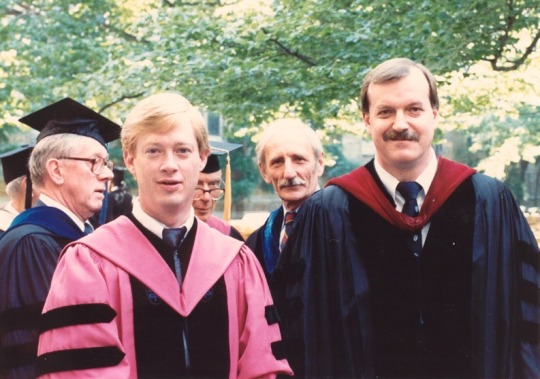
So anyway, this brings us back to the legend of Sergius and Bacchus. The version that Boswell translated takes great pains to show how Sergius and Bacchus were equals in every way. They're both Roman officers, they're about the same age, they sing in unison, and are united in the egalitarian love of Christ. However, they are still just a little bit unequal. Sergius is of a slightly higher rank than Bacchus.
To be clear, this whole legend is a literary creation, and it's got a bunch of Byzantine propaganda in it. It's not history, it's mythology. Whoever wrote it down would have been familiar with erastes/eromenos dynamics, because these were everywhere in classical antiquity. So they made sure to specify all the ways in which Sergius and Bacchus were equals, but took a firm position in ye olde fandom top/bottom discourse.
Throughout the legend, Sergius acts, and Bacchus is acted upon. Bacchus is killed first, and Sergius is temporarily demoralized. Bacchus then appears to Sergius in a vision encouraging him to stay strong. Sergius is so steadfast that they can't torture him enough to make him recant his faith, and he is beheaded. Even straight couples are not usually said to have been reunited in heaven, but Sergius and Bacchus are.
So, knowing that Sergius is the erastes and Bacchus is the eromenos in this story, we can start to notice it in iconography too. It's not always consistent, but sometimes icons will have Sergius' cloak curling protectively over Bacchus' head, or one of them taking a slightly more "authoritative" posture, etc.
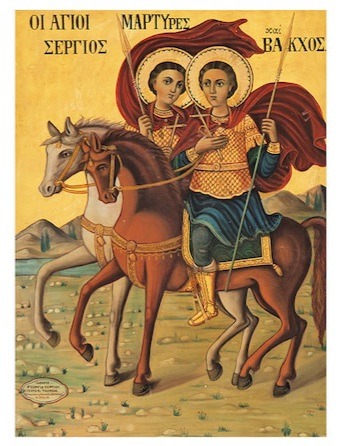
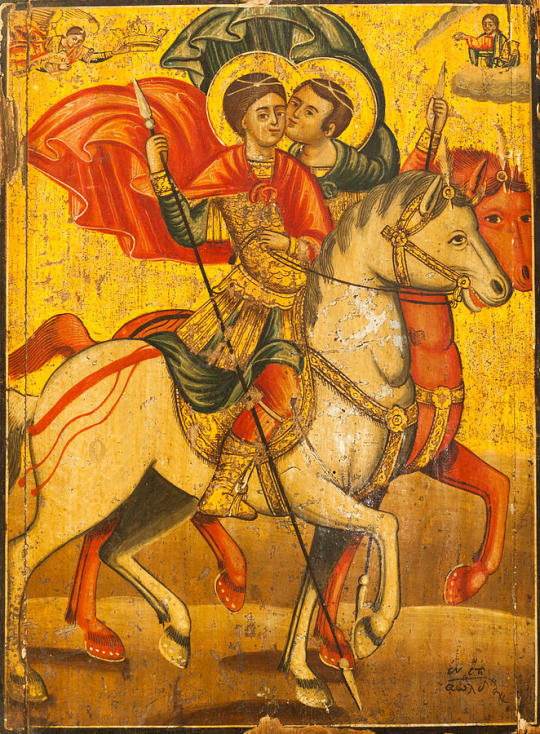
Above all, they are always depicted as true equals--sometimes they almost look like twins.
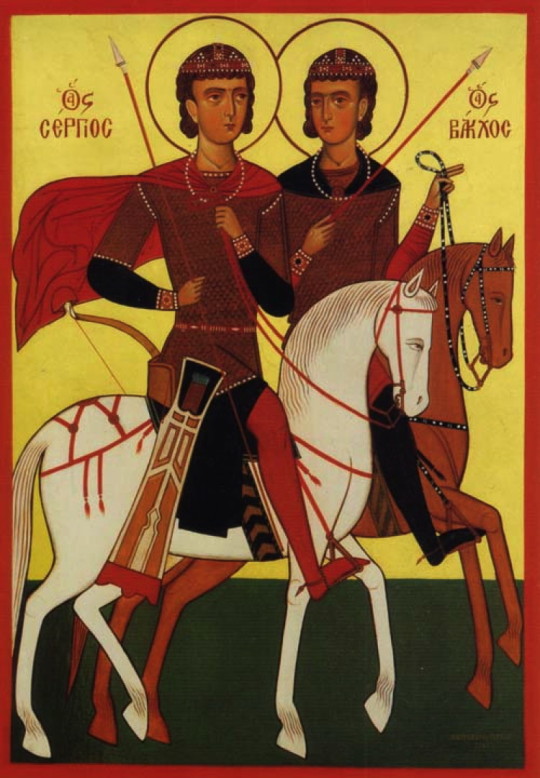
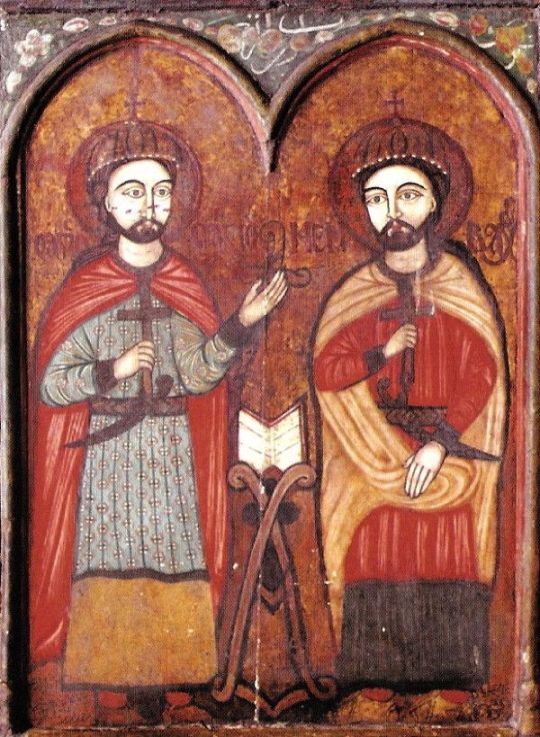
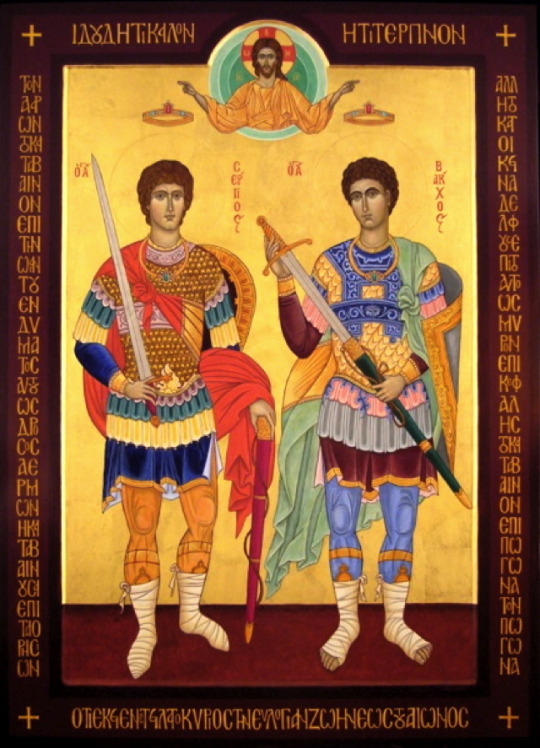
Increasingly, modern icons are being made that explicitly communicate the idea that they were a gay couple. The one on the left was created by Robert Lentz, a Franciscan friar, for Chicago Pride in 1994. The one on the right makes the classical homoerotic aesthetic super explicit, and is by far the most sexually-suggestive "traditional-style" icon I have ever seen lol. Shoutout to this artist.
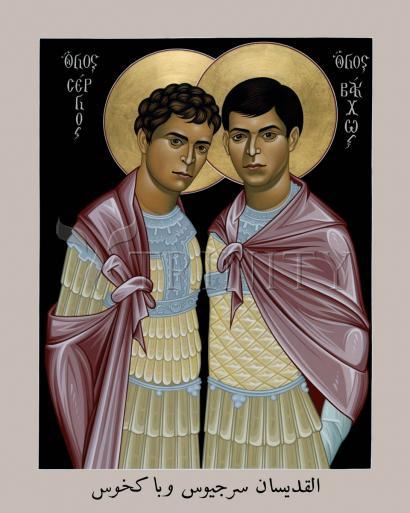
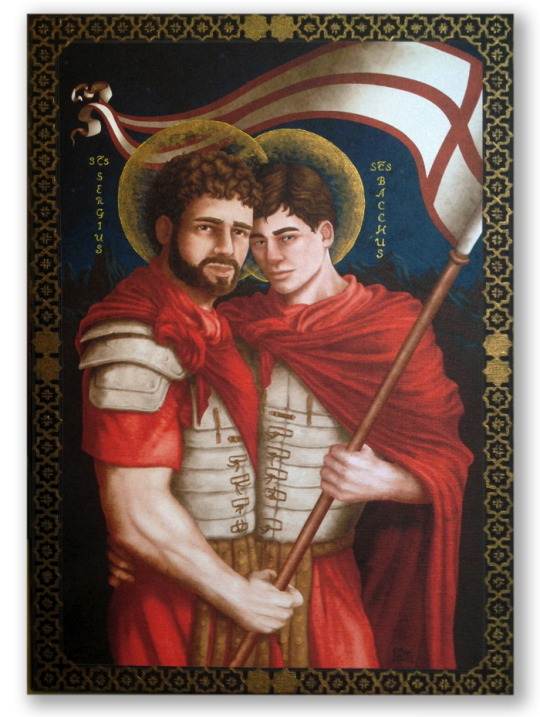
So to sum up: John Boswell knew what the fuck he was talking about. Also, none of this excuses the homophobia in the Christian scriptures or the homophobia that Christians continue to perpetuate. However, knowing what to look for in art and writing helps us understand that gay people were not magically granted the ability to have egalitarian relationships in the modern world, and THAT leads us away from problematic apologetics.
761 notes
·
View notes
Text
The Resurrectionist (or 'Crowley's dying briefly because character-building, and here's why')
I should start off by saying, friends, that I have written exactly zero books. (Bloody lot of fanfiction, but no actual novels). And I like coffee, but not particularly with oat milk. (The poison's metaphorical, not physical), but... well, you guys can keep both of 'em, because they're just not relevant to this conversation. I am also, as you may have already guessed, not Neil Gaiman. A chick can only speculate, but she does like to back it up with actual evidence.
No, I'm simply here to ask you a question.
What's the single worst thing Heaven could ever do to Aziraphale?
What would drive our angel so far from the clutches of Heaven that he would never, ever wish to return? What would set him unequivocally free from six millenia of assumed responsibility; what would make him realise that God can never change? What would strip everything away from him?
Because of course, this is what we have to do next series. This is Aziraphale's whole arc. If he doesn't try and change things and fail, he will always wonder. Always have a 'what if.' Will never be able to truly move on, will never be free from the eternal abuse cycle.
And so the severing has to be monumental, and everlasting. Then we get our happy ending. Storytelling, loves, done flawlessly. (Again, not a novelist... just a girl who's been writing for over half of her lifetime.)
And so, I ask again:
What's the single worst thing Heaven could ever do to Aziraphale?
And, well, it's a manifold question isn't it, with lots of potential ans - no I'm just kidding. Very simple question, very simple answer.
So congratulations to the very likely hundreds of you who have just said 'murder Crowley,' because a. you're very much correct and b. we've all just predicted the end of series three.
(... I mean, probably not the very end. But the emotional crux, definitely.)
And naturally, I'm not talking discorporation. I'm talking 'wiped from the universe altogether, leaving our angel eternally alone' kinda murder. The real shit. The good shit. Never mind any of this 'editing the Book of Life leading to an ineffable paradox' kinda bullshit - this is Heaven, the natural source point of holy water. One miracled Supersoaker and our demon's ancient history, friends.
Because y'see guys, severing Aziraphale's connection isn't the only problem we face in terms of narrative romance. We've also got Crowley, who has spent six millennia being in love with a guy who just takes, takes, takes... him for granted.
And this is NOT to say that Aziraphale gives him nothing back - he so very clearly does. (I am a consummate Aziraphale apologist, Crowley's just as much of a fool post-series two as our angel is, and Aziraphale needs this, as I've mentioned.) But... Crowley is his teacher. His moral guide. His protector. It mostly goes one way, and despite all of that and him being happy to be that guy for all this time... right when it matters most, Aziraphale (to Crowley, at least) has abandoned him. He's told him he isn't good enough.
(... Which is bollocks. That's not what Aziraphale's said at all, they're both as overprotective as each other and have a desperate, painful longing to keep one another safe in their own best way. But it sure fucking looks like it to CROWLEY, which is what matters.)
And so, we have two issues in achieving our happy-ever-after.
Sundering Aziraphale from Heaven forever;
Ensuring Crowley trusts him fully and knows completely that he is Aziraphale's only choice.
(And also by GOD do they need to have a proper conversation, but that one kinda goes without saying. It'll happen.) We have to even up this relationship; we have to make it absolute narrative equilibrium, and I am absolutely sure Neil knows this probably far better than I do.
... And so, how do we achieve both these things in one hit, whilst also telling a Second Coming story and holding a celestial war?
Well, we kill Crowley. Obviously. Not until episode five or six and after an emotional, romantic reunion of mutual understanding, but... we kill Crowley.
... And then Aziraphale brings him back. Yes, from complete death.
I would like at this juncture to remind you that miracles, apparently (and this is a thing we've just learned guys, almost like it's suddenly going to be relevant ongoing) are measured in Lazarii.
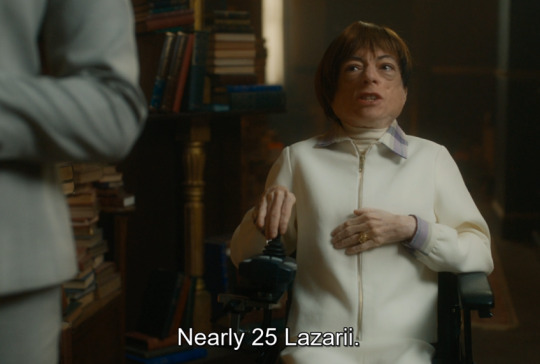
(Great thanks to the Aziraphale to my Crowley, @porgthespacepenguin, for these few screenshots I'm showing off here today. You'd never leave me, not even for my own good. <3)
Lazarii is very obviously named after Jesus' apparently greatest miracle, of raising Lazarus from the dead in the book of John. They managed to achieve twenty-five times the necessary amount of energy it takes to bring someone back from death... without actually fucking trying.
Let's take a look at the book of John a sec. Or more specifically, its eleventh chapter and twenty-fifth verse.
Jesus told her, "I am the resurrection and the life. The person who believes in me, even though he dies, will live."
My thanks to Neil once again for murdering me like Heaven's going to murder Crowley. Cold blood, point-blank.
'Who believes in me.' Huh. Only for the past six thousand years, Aziraphale dear...
Here's a little of what the internet has to say about the number 25 in numerology, by the way.
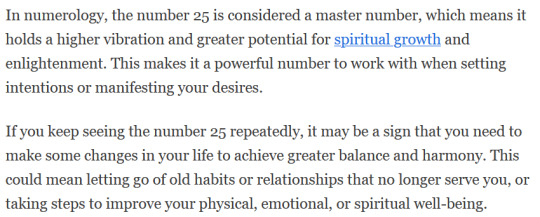

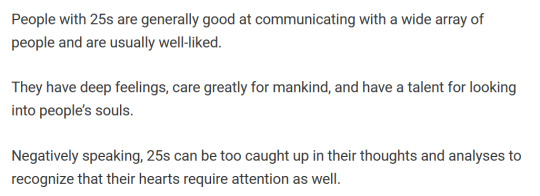
And may I also remind you at this stage that there is a pub in this series called The Resurrectionist, and only Aziraphale goes into it.
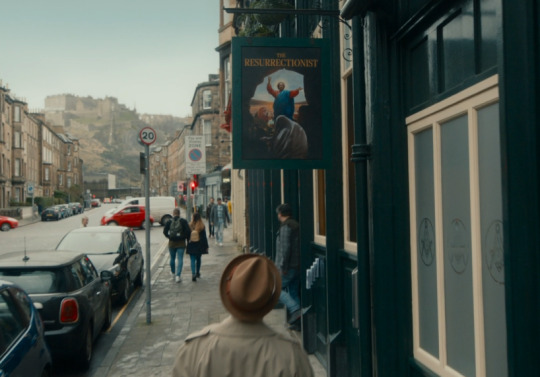
I mean sure, Crowley's booksitting and trying to make the ladies hilariously like him and Aziraphale fall in love in the same way he himself did, but the fact remains... one relevant pub name. One guy. (We all need a narrative excuse sometimes Neil, I get you.)
Considering all this, friends, let me ask you another question. This one's a little more wordy, that's on me.
What do you think would happen when a being capable of raising someone from the dead twelve and a half times over for the sake of his beloved's protection loses said beloved beyond all doubt?
... And this will be after he gains the ultimate celestial power-up, by the way. In case we'd forgotten that that alone is also about to boost Aziraphale to the fucking stratosphere, and finally put him on an equal footing with Crowley. (Who is clearly an ex-archangel, but not Lucifer, so Neil's since said.)
... And I think we know the answer, don't we? The kind of miracle that
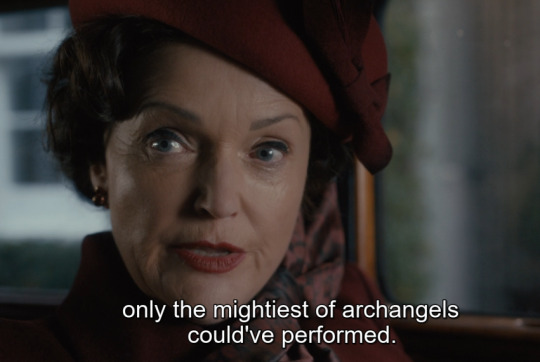
(You can't see me, but I'm staring into the camera like I'm one of The Office main cast right now.)
This is the kind of power that fucks with reality - the kind of power that scares Heaven and Hell to absolute death, hence Metatron being in the DMs. And crucially, this miracle was boosted because of love. Because of a desire to keep the status quo, their 'own side'. You amplify both those conditions to the nth degree by destroying one of them? It's over, lads. Resurrection is the beginning.
Resurrection evens up a playing field. It destroys Aziraphale and renews him in one hit; it proves to Crowley once and for all that Aziraphale loves him exactly as he is.
... It's a no-brainer, pals.
And what do they do after this? Well, fuck up the celestial order, naturally. I have theories, the main one of them being that they're going to be God and Satan respectively and unite Heaven and Hell in eternal marriage, but... that's just a theory. A television theory.
The resurrection thing? Not so much.
... See, this is the thing, my friends. You don't need to have written a 16k essay to predict the future.
All you need is the ability to tell a story, an observant eye for that which is already present, and a simple question. (Followed by a mildly more complex one. It's a working allegory.)
... I'm just going to leave you with this one shot of Aziraphale picking up his own destiny. Because poetic cinema.
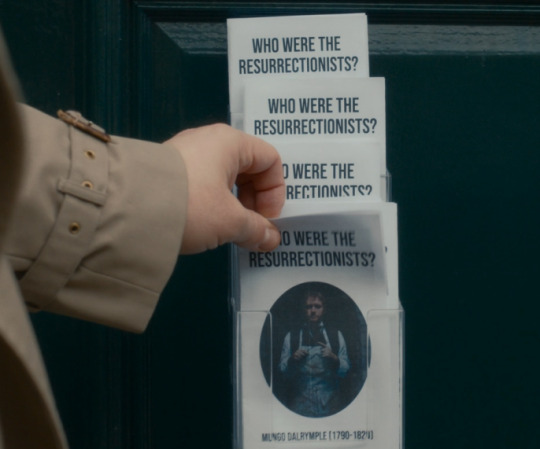
#good omens#good omens 2#good omens season 2#and even a little bit of#good omens season 3#ineffable husbands#crowley#aziraphale#the nice and accurate prophecies of celestialholz#good omens meta
325 notes
·
View notes
Note
do you have any arthur/guinevere/lancelot recommendations? if not, just stories where their characters were done justice and their friendship is explored and the love triangle comes to some satisfying solution.
i sure do! as always, with caveats. this list has two parts: films first and then books as i have suggestions for both! all of these movies can be watched here and the books read here.
TL;DR movies: Excalibur (1981), Camelot (1967), Knights of The Round Table (1953), Merlin and The Sword (1985), Sword of Lancelot (1963)
TL;DR books: The Birth of Galahad by Richard Hovey, Arthur Rex by Thomas Berger, Guinevere Trilogy by Persia Woolley, Guinevere by Lavinia Collins, Spear by Nicola Griffith, honorable mention to Arthurian Saga by Mary Stewart
MOVIES:
Excalibur (1981): for me it has everything. we get to see young stupid arthur and clever curious guinevere fall in love, their wedding is gorgeous, then nicholas clay my beloved lancelot throws a wrench in it as he loves and respects them both so much, and they love him. he gets to be crazy about it too like running off to the woods to beg god to take these feelings away, dreams he's fighting himself and ends up impaled<3 meanwhile arthur/guinevere leave a cup out for him even when he isn't there. the crux of it comes when guinevere is accused of cheating (which she hadn't even at this point) and arthur won't champion her because his kingship comes before husbandly duties, so lancelot fights for her honor instead. at the end, after guinevere has gone away to a convent (lancelot is a wildman with a full beard lost to them all) arthur comes to retrieve excalibur from her and his speech is so romantic about finding her in the next life. i die every time. here is my review of that movie.
Camelot (1967): i adoooore this guinevere. jenny<3 she does whatever she wants and i love that for her. the whole may day queen aspect of her is muah chef's kiss. small wonder arthur loved her immediately. this arthur gets to wear eyeliner which is a plus. lancelot almost kills arthur on meeting him and then falls at his feet on realizing it, only for guinevere to be really cold to him at first, trying to get other knights to defeat him, but ends up falling in love with him. which arthur totally knows and turns a blind eye to btw. even when pellinore brings it up in as gently as possible, arthur bites his head off, knowing he cant even entertain the rumor or else the kingdom is in danger, and he just wants his two favorite people to be happy....cries forever.
Knights of The Round Table (1953): the biggest downside to this one is that lancelot has a horrible insufferable american accent. however his celebrity worship/instant friendship with arthur is soooo good. he breaks his own sword for threatening the king and then arthur gives him his own....is that even allowed to be so adorable? anyway so lancelot had met guinevere before they were arthur's friend and wife, essentially had a charming meet cute, and went their separate ways, only to formally meet at the wedding in front of everyone....god, the eye contact could turn someone to stone. arthur is extremely sympathetic and compassionate, to the point that when he catches guinevere sulking alone on the roof with a gift from lancelot, he says "i miss him too..." bruh???? my heart?? all around delicious food.
Merlin and The Sword (1985): huge disclaimer...this movie is ugly as sin lol the only version available is ripped from a vhs tape so it might as well be a crunchy gif at this point. it was also cut down from the 3 hour tv version to 1.5 hours which is a tragedy. (i've tried emailing the studio for a rerelease to no avail...) however it has the most insane arthur/guinevere/lancelot ever i'll never be the same. arthur is played by malcom mcdowell who always brings his a game to roles. he's a bit older than guinevere, but she apparently taught him to read? he dotes on her but he's somewhat emotionally stunted which gets in the way. this guinevere is gorgeous i'm obsessed with her she has this deep sultry voice and a simple elegance that completely shatters lancelot's resolve. i get it, it would work on me. lancelot meanwhile is this incredibly lanky sometimes mute shy guy who is besties with gawain and his meet cute with guinevere involves the mingling of their blood after they are both cut on some rose thorns? hello???? they're freaks just like chrétien intended. the blood. they share bath water and fuck in a dungeon. then after guinevere is rescued from meleagant, arthur asks merlin for some sort of potion to help guinevere recover emotionally instead of like.....talking to her? he's trying but so so bad at it<3 he then takes her to bed to "treat her like a queen." IT'S ALL GREAT IT MAKES ME FERAL ARGH
Sword of Lancelot (1963): this one is fun because cornel wilde wrote it, directed it, and starred as lancelot himself!! the other fun factoid is the woman who plays guinevere is his real life wife. how stinking cute is that? so obviously their chemistry is ridiculous. but arthur is a cutie too. he's older and tends to talk down to guinevere a bit, which makes sense why she befriends lancelot in her loneliness. lancelot gets a lot of development, taking young tor under his wing, besties with gawain and lamorak and gareth. being irl married to guinevere also makes their disagreements feel very real. arthur is counseled by a ton of characters, bedievere, merlin, even mordred is here giving his two cents. so you really feel that tug of war pulling the throuple apart. it hurts.
BOOKS:
The Birth of Galahad by Richard Hovey: this play is wiiiiiild but the take away here is that guinevere is the mother of galahad. like what a twist. meanwhile all the men are away fighting rome so you get this tragic back and forth switching of perspective between lancelot and arthur missing guinevere (plus galehaut is here as counsel which really kicks this up a notch) then it cuts to guinevere with a new baby and tormented by the prospect of whether to write to rome with the news but afraid it will cause an upset where she cant be.....hovey you mad lad you've done it again.
Arthur Rex by Thomas Berger: i hate i keep having to recommend this bigoted book but damn it this arthur/guinevere/lancelot are so good. why are they sooo goood???? this arthur is compelling since he loses his virginity to morgause and is forever messed up after that, so he struggles to connect with guinevere in the way she needs, not really understanding her even though he bends over backwards to please her. meanwhile there isnt a word for what she and lancelot have here they need to be studied under a microscope so history doesn't repeat itself they're so twisted it's wild i can't look away. and the friendship between arthur and lancelot is so powerful and enduring that even at the end while joyous garde is under siege, arthur sends in kay with food the moment he hears their stores are low, and has him serve them like old times. he doesnt want it to be the way it is....sick and twisted narrative choices.
Guinevere Trilogy by Persia Woolley: i admit this isn't my favorite guinevere, but credit where it's due, she's a complex and fully realized character. through her we come to understand both arthur and lancelot as deeply damaged men, who had their emotional states devastated by the fall out of sexual abuse, and how that impacts their relationship with her (and their sons, mordred and galahad, who likewise suffer as a result of their fathers' emotional states). as a celtic queen, guinevere has every right to take a lover if she so desires, and arthur is not ignorant of his own failings as a husband, but the tragedy plays out anyway as the orkney brothers are there to wreak havoc on the place as usual. (you might find that this has a movie adaptation Guinevere (1994) don't watch it, trust me, it's not even fun bad, just cursed.)
Guinevere by Lavinia Collins: this is technically part of a series so you'll also get a lot of arthur and lancelot in the other three (Igraine, Morgawse, Morgan) but for the sake of this list, the guinevere one will suffice. anyway what i like about this is the strong contrast in relationships with both men. lancelot is bisexual and guinevere is the first woman he ever sleeps with (but not the last...) so theyre very tender and sweet together meanwhile arthur sired mordred before marrying her he's overall more adventurous while keeping entirely faithful to her for the rest of his life......there is a threesome in this but ironically its lancelot/guinevere/kay and not arthur but you know what? he deserves a win. this still goes on the list.
Spear by Nicola Griffith: this is perceval pov so the focus on arthur/guinevere/lancelot is minimal, but its delicious. arthur is kinda cold and mean here (falling back on the celtic "bear" thing, same as woolley does) but its revealed that he, lancelot, and guinevere are in a throuple, the characterization of lancelot's shy explanation of this was so good, and he goes on the grail quest to try and heal guinevere's womb so she can have their children, as it's a point of tension that mordred and galahad both exist, but guinevere wants to have children with arthur and lancelot. there's literally a part she faints and they both carry her off to bed like....they dont even pretend its any other way. no homophobia or slut shaming or anything like that in this book which is a huge plus. palate cleanser after arthur rex lol
Arthurian Saga by Mary Stewart: this is more of an honorable mention, as the first three books are merlin pov and the fourth is mordred. but book two (the hollow hills) has arthur raised alongside bedwyr (who is lancelot in all but name, son of ban, eventual lover of guinevere etc) they are the best of friends its adorable, bedwyr gave him his dog cabal, which is cute on its own, then fast forward to mordred pov (the wicked day) decades later and arthur is picking out a new puppy and names that one cabal too, its like this long homoromantic ritual that every dog descended from the first calls back to his original gift....im pulling my hair out. guinevere here is underdeveloped at best, as merlin doesnt really know her well and mordred's perspective on her is that shes (respectfully) hot lmao but worth mentioning as mary stewart is the goat, highly recommend her books.
and that's the list. hope that gives you some stuff to chew over!
#arthurian legend#arthurian legends#arthuriana#arthurian mythology#king arthur#queen guinevere#sir lancelot#ask#anonymous
55 notes
·
View notes
Note
I've been meaning to ask about this because I love love LOVE your writing but aren't really very deep into the hermitcraft fandom....
would I need to know anything prior to reading your hc fics? I've heard very many good things about redstone and skulk and I want to read it , but I dunno if walking in clueless is a good idea...
Oh. Hm. Well. I'm maybe not the best person to ask this, ironically. I have a hard time differentiating between actual common knowledge and fandom osmosis common knowledge. My thoughts under the cut because this might get long, but here are my, I guess, fandom initiation thoughts on my fics, for anyone curious?
Redstone and Skulk:
I think it can reasonably be read with little-to-no prior knowledge of the fandom. I do a decent job of explaining what the story is about, since most of it is original worldbuilding with (mostly) original characters. It's a mirror world, where in the main world death doesn't exist, but in the mirror world it does. All the mirror world characters are the bad parts / evil twins of the main world characters, and how they cope with that varies (and is sometimes explicitly stated). The first few chapters do a decent job of establishing this information, and I've had a few people mention RnS was either their first delve into hc fandom, or they had never been in the fandom and read it anyway because it came recommended by a friend. This signals to me it would be about like reading a sequel to a book series. You're clearly missing some establishing character stuff, and maybe some setting stuff, but you're not missing enough to be completely lost.
[basic knowledge of Minecraft mobs and game mechanics would definitely do you good, but that goes for all of these].
Monsters Splitting Hairs:
I personally think you can jump into this with no prior knowledge. All the characters are loosely based on the hc members they're named for personality wise, and place names [Octagon, Horsehead Farms] come from builds the players have made. Just about everything else is my personal world building though. The only upper hand knowing about HC will give you, is maybe cluing you in to who/what the different monster characters are before they're revealed [a la Rendog, who walks around with dog ears on his MC skin, is very obviously a werewolf in the fic.]
This fic is unfinished, and while I plan on finishing it eventually, it isn't being actively updated, and probably won't until RnS is done. It does have a lot of words on it though.
Hound's Tooth:
You need to know a lot of information to go into this one. Not only do you need to know a decent amount about the HC characters, knowing about both 3rd Life and Last Life is also kinda necessary, since the crux of the character motivation is Doc angsting over Ren doing Last Life after 3rd Life fucked up all his friends so bad the first time. Also, you need to know a decent amount about the early Octagon plotlines in s8 of Hermitcraft, the different adventure mode trial rooms they did.
This fic is finished.
Everything else I've written are ficlets, little one or two chapter deals. Anything tagged "RnS fic", you should probably read RnS before reading. Most of the others you need specific information for, since they're generally addressing topics that I had /just/ watched an episode for at the time, and I was responding to an idea or plot point being brought up. Anything with "Hels" or "Helsmet" in the tags or title, know it's about the mirror world and the evil twins.
[shrug]
I hope this helps?
#answering asks#anonymous#im glad you like my writing enough to try to read stuff out of your normal fandom sphere :')#thats very very cool of you#if you do give the fics a shot i hope you like them! and i hope theyre not confusing
25 notes
·
View notes
Text
Mark Lewisohn and the No Good, Very Big Scoop
A few weeks ago, I made a post showing that Kim Bennett, the crucial interviewee who provided the crux of Mark Lewisohn's "debunking" of a classic Beatles myth, was not, as Lewisohn has suggested, completely absent from Beatles history. Kim Bennett had been quoted in an issue of Beatles Book Monthly, in which Mark Lewisohn, aged 10 1/2, also made a brief appearance.
That was a teaser, and now that any interest it may have stirred has had time to die out, it's time for a proper introduction to what has become an unwieldy examination of Tune In's biggest scoop.
I came across Kim Bennett in that issue of Beatles Book Monthly while I was working on a "Lewisohn vs." post focusing on George Martin's memoir, All You Need Is Ears. Checking those citations went off the rails before the train had left the station. It led me to take a closer look at the way Lewisohn tells the story of how the Beatles signed their contract with Parlophone. This section of Tune In represents the biggest Beatles "myth" that Lewisohn busted, and it has been discussed in any number of reviews and interviews since the book's release. Yet the evidence given for Lewisohn's biggest scoop was thin, and relied disproportionately on the word of Kim Bennett, a man whose story only saw the light of day because of Mark Lewisohn--or so he would have us believe.
I did some digging. I found the aforementioned quote from Bennett. Then I found another one, in another issue of Beatles Book Monthly. Then I found him in the pages of a prominent book of Beatles history. Then another book, and another.
Kim Bennett's evolving story was the first red flag, but the more I dug, the more problems I found with Lewisohn's choice to present the Bennett version as definitive. The other supporting evidence Lewisohn brought to the table was, at best, thin. Evidence supporting the classic narrative went unaddressed. His heavy-handed authorial choices evinced a man trying to overturn a narrative to further his own reputation and book sales, not a historian using his best judgment to parse conflicting accounts and come to his best assessment of the truth.
My intention here isn't to attack Kim Bennett or to defend George Martin from an unflattering portrayal of his role in the Beatles' contract signing. Nor do I think Kim Bennett's account should be stricken from the record entirely. My focus is on Lewisohn's choice to present Kim Bennett's story as an undeniable Truth in the story of the Beatles. At best, his historical judgment utterly failed him, at worst--and far more likely, in my view--Lewisohn put forward a substandard work of history solely for the sake of grabbing headlines by disrupting a traditional narrative.
There's a lot to discuss with the Bennett/contract story, which I'll discuss in future posts. My ~tentative~ table of contents is:
0. Mark Lewisohn’s Star Witness
1. An Introduction and Primer >You Are Here<
2. The Evolving Story of Kim Bennett, Pt. 1: Before Lewisohn
3. The Classic™ Contract Story, and Why Lewisohn Distrusts It
4. The Evolving Story of Kim Bennett, Pt. 2: Tune In
5. Lewisohn’s Other Sources
6. Lewisohn’s Portrayal of Kim Bennett & George Martin
For now, I'll set Kim Bennett aside and briefly address another Busted Myth in Tune In: the story of young John Lennon, forced to choose between his mother and father.
Alf Lennon and Billy Hall: A Lewisohnian Microcosm
Along with the story of the Beatles’ Parlophone contract, Tune In’s new take on the traumatic custody dispute over John Lennon is one of the book’s most discussed “revelations.” This story plays out over a few pages (unlike the Kim Bennett/Contract narrative, which sprawls across several chapters), but it demonstrates many of the same heavy-handed writing choices Lewisohn makes to prop up a “definitive” version of events without adequate evidence or analysis. The tactics Lewisohn uses fall into three broad categories: (1) misrepresenting opposing evidence and (2) inflating the credibility of supporting evidence, and (3) creating a false dichotomy between two accounts.
I'm sure you're familiar with this classic tale. It’s been written in nearly every Beatles biography starting with Hunter Davies’ The Beatles (1968), as told to Davies by John’s father, Alf Lennon. The story goes like this:
Alf Lennon took five-year-old John to Blackpool, ostensibly as a holiday, though he planned to keep his son. They lived with a friend of Alf’s for two weeks. That friend planned to emigrate to New Zealand; Alf decided he should emigrate as well, with John in tow. These plans were foiled by the arrival of Julia, and a custody dispute ensued. At an impasse, Alf asked John who he wanted to stay with. John at first picked Alf, but when his mother started to leave, he ran after her.
The story has been embellished over the years, but those are the core facts as related by Alf. Mark Lewisohn doesn’t believe it happened this way. He tracked down the friend Alf and John stayed with in Blackpool, Billy Hall, and asked for his version of events. Hall’s testimony would form the basis for one of Lewisohn’s major MythBusting moments.
I’m not going to dissect these events in depth here. What I want to illustrate is the way Lewisohn sells the reader on his interviewee, Billy Hall, and Hall’s version of events. From Tune In Ch. 2:

Lewisohn starts by introducing Billy Hall as the "only living witness" and "the only person to relate the events impartially."
I’ll give him “only living”, but Lewisohn does nothing to demonstrate his impartiality. Generally, one would assume a guy relating the story of a disagreement his friend had with his ex would have some degree of bias. Lewisohn knows this, but to overturn this classic narrative, he needs the reader to trust Billy Hall. He can’t show Hall’s impartiality, so he must tell the reader.
“Witness” is also doing some heavy lifting here. More on that soon.

Before jumping into Hall's version of events, Lewisohn tells us how how “[e]very account” of the story has been told to date. With this phrasing, Lewisohn purposefully obfuscates opposing evidence; rather than acknowledge that Alf Lennon himself gave this story, he presents it in the vague terms of "[e]very account." Acknowledging that these accounts arise from a primary source would give them strength, so Lewisohn portrays it as another old chestnut in the pile of oft-repeated Beatles stories. It might seem like a simple turn of phrase here, but we’ll see this tactic pop up again soon.
Framing aside, the passage highlighted in blue is in keeping with Alf’s story as told to Davies. That changes once we get to the phrase in pink. According to Lewisohn, “[e]very account…turned on the vital fact” that John would first emigrate with Billy Hall’s parents. This is just a lie. I have read multiple accounts that do mention Hall’s parents involvement in the plan, but, crucially, they play no role in the story Alf Lennon told Hunter Davies. Davies writes, “The friend he was staying with in Blackpool was planning to emigrate to New Zealand. Fred decided to go with him. All the preparations were made, when one day Julia arrived at the door.” (Davies 1968, p.8)
Hall’s testimony doesn’t contradict the premise that Alf wanted to take John to New Zealand (“…Lennie said he might [emigrate to New Zealand] too…and at some point it was mentioned that it would be a great place to raise Johnny”), but says definitively that his parents had no intention to emigrate. To present this as a proper MythBusting, Lewisohn makes the detail Hall contradicts (his parents involvement) central to the story as a whole (“[e]very account….has turned on...”) He’s moved the goalposts by framing a detail he can debunk as crucial to the story, when that detail wasn’t present in the primary source to begin with.
Then, in yellow, Lewisohn lets us know that the classic version of events "is fantasy." Or rather, Lewisohn lets us know that Billy Hall says its fantasy. It's a heavy-handed introduction. Hall is never given any pushback, and we're left with the impression that Lewisohn wants the reader to believe Hall's conclusion.
Hall goes on to say that Alf couldn’t have emigrated anyway because Alf, “had to go back to sea. He had to go back. We were only on leave.” This is a blatant example of Lewisohn refusing to question or push back against an account he wants the reader to believe. Alf Lennon already had a history of going AWOL, so “It couldn’t have happened because Alf wouldn’t go AWOL” isn’t convincing evidence. Lewisohn doesn’t bring this up, though, and indeed provides no comment on this section of Hall’s testimony. He lets it stand unquestioned.
Here's how Lewisohn introduces us to the custody dispute between Alf and Julia:
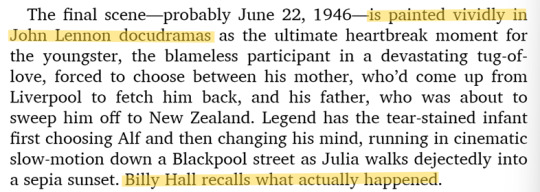
Lewisohn describes the well-known version of events as “painted vividly in John Lennon docudramas.” Again, Lewisohn neglects to inform the reader that this story comes from from Alf Lennon - one of the three people in the room where it happened. The “docudramas” didn’t make up this chapter in John’s life—they based it on the words of his father, and accounts of people close to John (e.g. Cyn.) We would expect Alf to have some bias in the matter, but that’s no reason to complete discount his story.
Also note Lewisohn’s use of charged language to highlight how melodramatic the “docudrama” version of events is. Silly of you to believe such made-for-TV sensationalism, reader! Luckily, Lewisohn has found someone who “recalls what actually happened.”
How Lewisohn knows this is “what actually happened”, he doesn’t say. But trust him—this isn’t just another version of events, it’s the version of events. Billy Hall says:

(The “Terry-Thomas character” mentioned here is Bobby Dykins, Julia’s boyfriend)
Right off the top, Hall says that the conversation happened in a different room. THIS is Lewisohn’s decisive witness—a guy who didn’t see things go down. Have you ever lived with someone, readers? Ever had a college roommate who got into a fight with their significant other in the other room? Even if you did your best to eavesdrop, would you be able to confidently say what happened if you were asked to recount it sixty years later? Would you weigh your word more heavily than the people in the room itself?
Billy Hall is only a “witness” in the loosest sense. He can tell us what happened around the fateful meeting, but he has no information on the actual event.
Billy tells us that Alf told him “I’m letting Johnny go back with his mother—she’s going to look after him properly.” Okay. Maybe Alf was broken up about events but wanted to save face in front of his friend. Maybe Alf wasn’t broken up, having just spent two weeks parenting after spending much of John’s life as an absentee dad. There’s nothing here that precludes a tense exchange occurring in the room. The room where Billy Hall wasn’t.
Finally, and damningly, “I really can’t remember if Johnny was in there too.” So Hall admits that he has no memory of the crucial detail of whether or not John was in the room, yet Lewisohn wants us to believe his account is “what actually happened.”
I commend Lewisohn for seeking out people like Hall, people peripheral to the Beatles’ story that may nevertheless add depth to it, but I seriously question his choice to present Hall’s version of events as definitive. He presents Hall’s story without question or criticism, outright telling us that a story told sixty years later by a man who wasn’t in the room where it happened is impartial and definitive. Meanwhile, Alf Lennon’s account isn’t attributed to him—it’s veiled behind catch-alls like “[e]very account”, or conflated with “docudramas.” Lewisohn clearly isn’t treating these accounts with equal scrutiny; he’s purposefully uplifting a version of events that contradicts accepted “myth.”
One final point that drives this home is Lewisohn’s choice to portray Billy Hall and Alf Lennon’s accounts as mutually exclusive. Rather than looking for how these two stories might dovetail, he creates a false dichotomy between them. This begins by framing the role of Billy Hall’s parents as crucial to the existing narrative, but it’s most clear in the utter absence of effort by Lewisohn to reconcile these two accounts. Aside from the point regarding his parents, what does Billy Hall contradict here? His portrayal is different from many dramatizations, but there’s very little that goes against Alf’s account. There’s no reason to completely throw out one or the other; there is every possibility these are two angles on the same story, not two mutually exclusive events.
But “Alf and Julia Lennon’s argument over John’s custody was maybe more sedate than sometimes depicted” isn’t getting headlines. It doesn’t make for a good talking point, and it certainly isn’t increasing Lewisohn’s prestige as the man finding out the True Story of the Beatles. Put simply, Mark Lewison chose to portray Billy Hall’s story as busting a Beatles’ myth not because a careful examination of the evidence supported that conclusion, but because disrupting a narrative would increase his profile and the profile of Tune In.
This isn’t an isolated example. We’ll see many of these tactics again with the story of Kim Bennett.
Sources:
Davies H. 1968. 2009 Edition. The Beatles. New York (NY): W.W. Norton & Company. 408p.
Lewisohn M. 2013. The Beatles: All These Years Vol. 1: Tune In. New York (NY): Crown Archetype. [ebook]
#mark lewisohn#tune in#the beatles#john lennon#alfred lennon#billy hall#kim bennett#lewi-sins#this is long as hell#oop
24 notes
·
View notes
Text
I loved today's episode of Be My Favorite, and here's something I never expected to say: I want to talk about Not. Specifically, I want to talk about the scene where Kwan asks Not to sign the book, because it's the crux of the episode and also gets at something I'm passionate about.
Not is an asshole; this has been well established. And my tiny flicker of worry that I'd be lured into some writerly fellow-feeling was quickly squashed when he said the most obnoxious "guy in your MFA" thing to Pear while handing her his book. He sucks and by all accounts his book sucks. He doesn't deserve encouragement.
But Kwan, seeing him in a moment of dejection, asks him to sign her copy of the book. She's not lying or trying to flatter him; she was telling him his book sucked before anyone else. And she tells him exactly why: because everyone needs encouragement, and it costs very little to give it. What I love about this is that the show isn't trying to argue that Not deserves encouragement. It's just saying, hey, he's human, he has feelings, and it doesn't hurt to be kind.
Max makes the same decision with Pisaeng at the coffee shop. He clearly sees exactly what's going on, and he's probably seen this plenty of times before. Fledgling gays can do a lot of damage as they flail their way toward self-understanding, and every older queer person I know has had to draw lines at some point around how much of that damage they'll absorb in the process of helping out the younger ones. We see Max first decide Pisaeng isn't his problem - then we see him reconsider. He can afford to offer a little kindness and patience.
The kindness Kwan and Max both offer ripples out, and ends with Kawi and Pisaeng both being able to be kind and brave with each other on the rooftop. I don't know where we go from here, but this felt like a watershed moment for the story, and it hinged on very small choices, to be kind and patient even when there was no obligation to.
This is a time travel story, so it's about small changes having big effects. And it's a story connecting university years, when people are still shaping themselves, to a decade later when patterns have been more strongly established. Even someone like Not is malleable right now - he responds to Kwan's kindness with a similarly low-cost gesture that means a huge amount to Kawi. I don't know that Not is ever going to become a great person, but maybe he moves away from whatever dire future has been hinted at. Or maybe he just behaves a little better sometimes, and gives our focal characters the space to grow instead of crushing them back as we saw him do with Kawi in the flashback.
In the beginning of the show, almost all the characters were unhappy or unlikeable or both. Now we're seeing how things can change as they keep reaching out to each other with honesty, with courage, and with kindness.
94 notes
·
View notes
Text
a brief ramble about character flaws
I was reading this blog about a very bad YA book I'll never read, and these paragraphs really resonated"
[The book] tries to acknowledge [the protagonist] more as flawed, but it is also afraid to show her as too weak. As much as she doesn't know how to rule, people who call her out are considered assholes. As much as she is impulsive and dramatic, [her love interest] is prepared to babysit her until she calms down. She blames herself for a lot of things during her depression arc, and it's great she learns to like herself, but she never really improves any of her flaws in the process.
It's like [her] flaws are things only she is allowed to fully perceive. Most people around her see her as near perfect, especially her love interets. So when [she] is made to confront [her flaws]...the crux is not overcoming her flaws, but seeing herself as [her love interest] does. As just kind of perfect, no real work needed.
I feel like this is a really common thing I've encountered a lot in various arenas (simblr, fanfiction communities, roleplay communities) and it was nice to have it laid out so succinctly.
A character's flaws need to go deeper than textual acknowledgment, and they can't be solved just by finding the right love interest. If a character is meant to be sloppy and careless, we need to see the consequences of her half-finished projects. A hot-headed character can't have arguments smoothed over and forgotten because that's just how she is and the love interest knows she didn't really mean it.
The second paragraph was especially resonant for me. It's a tricky issue to discuss because obviously, a supportive relationship can boost your confidence and enable you to tackle other issues in your life, but I don't like it when a character's primary flaw is "lacks self-confidence" and that hole is neatly plugged by "unconditional support from love interest."
Reading stories like that, I almost never get the sense that the character has actually grown or changed. She's exactly the same person she was when the story began, she just has a boyfriend now. In those stories, the love interest serves as an emotional crutch, and I'm always left with the sneaking suspicion that if anything happened to them, the protagonist would fall to pieces again. That's fine in a longer story where the character either builds confidence in their own right or loses the love interest and has to deal with the consequences of that loss, but it's often treated as a happy ending. For me, that's just not satisfying.
In general, I don't really like stories where the protagonist's major failing is imposter syndrome. I feel like it's the 2020's answer to all the clumsy (but otherwise perfect!) romance protagonists of the early aughts. It's not a real flaw (in fiction) it's just a placeholder that stands in for a different, more well-developed flaw that might drive character action or compel the reader in any way.
As much as we'd all like to think that we're perfect and just too hard on ourselves, a character who is literally, textually perfect and just too hard on herself isn't actually relatable or interesting to read about. The conclusion of a character's arc can't just be accepting that she didn't need to change.
21 notes
·
View notes
Text
I have this old Tumblr post I read forever ago tattooed in my brain... it was like "I like jekyll and hyde but the book is pretty classist since it depicts Hyde as a lower class criminal while Jekyll is an upper class doctor, I'd like an adaptation in which it is the other way around and Hyde uses money to get away with his crimes".
And the post isn't 100% wrong, you know, looking at how the characters are perceived rather than depicted... and how people don't tend to talk much about the implications of this perception...
...But the thing is, Hyde isn't a lower class criminal. At all. Period. He might be perceived as one before Chapter 4, but it is clear he isn't, and if he was, he isnt one anymore. He's the Victorian's worst fear: a lower class man BECOMING an upper class criminal, a guy that gets to be a gentleman even though he doesn't deserve it... all because he's blackmailing a guy that WAS born into money! He's this gentleman-criminal that should never have been it.
Well, at least pre-twist. That's when we find out (THE BIG SPOILER HERE! IF YOU DON'T KNOW THE BASICS OF THE BIG TWIST STOP READING) the truth.
Hyde was Jekyll all along, and that reveals that -GASP- the villain of our story was always a rich, well-liked, well-respected, most presumably white, doctor.
Pre- and post- twist, no matter how you look at it, Hyde is ALWAYS a rich man using his money and status to get away with it, with the added layer of using an entire different identity, complete with a completely different appearance, to never be caught or face meaningful consequences. He can make the little girl's family shut up with a hundred pounds, which is A LOT OF MONEY, like a lot, in the 1880s, and when morning comes, he can turn into Dr. Jekyll and "fix" what he's done. Easy as pie. He only starts realizing that he's gone too far when... well, he goes too far. Money can't get him out of a murder.
And as Newcomen says, "Money's life to the man". It IS a big damn clue to the mystery that a gentleman-criminal with expensive tastes would burn a chequebook to get rid of the evidence; he was already using money to get away with his crimes, and now it can't cut it! Only solution: to scrub himself off the face of the Earth, be Jekyll forever, protect his reputation, end of story, and since Utterson made sure Jekyll wouldn't be connected to Hyde's crime, he's never even going to set foot in a courtroom.
So, well, I agree that I'd like more adaptations in which Hyde getting away with his evil-doing through money, but I wouldn't say that doesn't happen in the book already. Because it is the crux of the book, if you look at it a certain way, but also because, important or not, it IS a plot point.
#jekyll and hyde#the strange case of dr jekyll and mr hyde#dr jekyll and mr hyde#jekyll and hyde weekly
123 notes
·
View notes
Text
I think the crux of how they ruined Alicent Hightower in the show and how that thing in the show is hyped up as the most 'nuanced' character ever is because fandom always confuses nuance with sympathy. They think the character is nuance because she now has a sympathetic victim backstory they can relate to and again another damming thing. The need of modern audience to relate to a character is just making characters more and more flat and the flatness is praised as good writing because these flat characters are used as conducts for feelings. Alicent Hightower should have been an antagonist, not a crying a doll and she is probably the character in the show that was ruined the most. She is a Sympathetic Sue and her lack of agency is never critised because modern audience can't stand not relating to characters or being in the POV of a character that contradicts their ideas or make them uncomfortable, such as it would have been if Alicent had been the child abuser she was in the book.
From TV Tropes:
This version of Mary Sue is often put into action by authors who think that a character can be made likable by writing them as The Woobie. Her life is packed with Deus Angst Machina either in her backstory or in the actual story she is in. She collects tragic events the way normal people collect baseball cards. And she is written with the sole intention of making you feel sorry for her. Like most Mary Sue subtypes, they can be male or female, but generally tends towards the latter since women are perceived to be more sensitive and vulnerable.
A good angsty character's emotional pain is never stylish, and does not necessarily involve weeping and wailing. People deal with pain in many different ways, usually by becoming trapped in one of the Five Stages of Grief. If they do resort to self-harm such as cutting themselves, it's not glamourised. And like any normal person who is grieving, there will be a justifiable reason for it, because when pain is great, talking about it is therapeutic and keeping mental anguish bottled up inside can be very unhealthy and result in severe problems later on. And the grieving will be because the character is actually in pain, not because they are trying to get sympathy from the audience.
However, justified angst can also be Wangst if the character grieving about it is out-of-proportion, and whether the grieving is out-of-proportion depends on the situation.
Their feelings of guilt will make sense, usually because of psychological scarring. Perhaps, just perhaps though, they were responsible for something that happened to someone else and are dead on with their remorse. They might have tried to do something to relieve the pain in the past, even if it failed. And canon characters do other things as well as comfort the angsty character. Even after the angst is gone, there's still a story to be told.
There isn't a story to be told with Show Alicent, especially now that the show robbed her from her biggest moment, which was assembling the Green Council and usurping the crown. If they wanted angst with this character, they could have waited until the war ended and all her line was dead.
68 notes
·
View notes
Text
Thoughts about fandoms and Writing
I suppose this will be a ramble of sorts. I wanted to talk about a sad thing I noticed but also a good thing I noticed about fandoms. This is a ramble, and I hope it all connects into a coherent whole by the end.
I'll start with the question I leave at the end. The question that my writing silently asks all readers:
"Here is a story of a human being that may be different from you, so will you join me at this campfire and hear their tale? To join them on this great journey of wonder, pain, joy, sorrow, and hope?"
One of the things that drew me to various fandoms, and my current one was a sense of connection. A sense of community, but I've also learned that despite this strength, there is an underlying undercurrent of who is allowed to exist in that community.
Part of writing fanfiction is because we want to see more of our beloved characters. To dig deeper into them, to fulfill this need for connection.
Because that's the crux of most things about us human beings, right? We are social beings that live best when we have connections with other human beings. None of us can live in a perfect isolation with no contact with anyone else ever (in fact studies show this is very, very, very bad for our health and can slowly kill us).
Yet, as a disabled person, I find myself stuck in this weird liminal space of seeking connection but sometimes finding instead reminders of how conditional my existence in the space truly is.
I notice that the stories willing to push the envelope a little, to explore what it'd be like if one of our beloved characters was disabled, often get far more harsh comments and far less support.
I've sat back and observed, and the more I interact with fandoms, the more I wonder if there is room for people like me.
I've seen some pushback in various fandoms -- even TLOK -- against people who want to explore our beloved characters in settings that allow for a more diverse intersection of identities. That tackle themes related to disability, gender identity, race, and so forth. To tackle more nuanced Leftist thought (that isn't displayed like a bad thing which TLOK sadly does at times).
This saddens me because that sort of pushback breaks the connection and community of fandoms in a way.
The whole reason I'm writing fanfiction is because I couldn't quite find the story I wanted to read. There's a lot of flaws in Legend of Korra, and I wanted to tackle the stories inherent in it from a different angle. To explore themes left unexplored. But also to show the shared moments Korra and Asami have. (They are legit my favorite couple of all time).
But I just don't feel very comfortable writing smut. I never have, so I'm already an outlier in the fanfiction writer community.
But I've realized of late that I also because an outlier with how I explore disability in my fanfiction.
Honestly Book 3 of TLOK sets the disability theme up, and although it does an excellent job with the PTSD arc, the way the temporary physical disability was handled during Korra's long healing left me quite frustrated because it utilized verbiage that's often used to demonize or deny disabled people support. No, it's not all in Korra's head (we find out later, that she really did still have poison in her, so Korra was right THE WHOLE TIME). No, it's not a mind over matter (this is the most unhelpful thing to say to a disabled person, seriously). No physical therapy can't cure all things. *sighs* I wanted more nuance there, and since it failed to deliver, I decided to write my own.
I also wanted to dig deep into Asami's story too because sadly enough TLOK doesn't give her the attention her and her trauma deserves.
So I have two separate series. One canon-compliant to explore the ramifications of that.
One an AU where Korra and Asami are romantically together by middle of Book 2, where they must navigate Book 3 and the trauma of that together. How do they do it? Can they do it? What sort of disability will they face and how will they deal with that?
I recognize what I write is not what most folks want from the fandom, and I feel like sometimes there is this unspoken undercurrent in the fandom to not really dig into the disability themes inherent in TLOK.
I think this is why commenters literally had a fight in the comments of my Shared Moments: Book 3. I had taken the disability theme in Book 3 (and 4) and made it highly visible. I had foreshadowed this quite thoroughly in all honesty.
I had made it clear from the start of the series that I promised to be realistic about trauma, about physical injuries, and about healing. Sure, I took some liberties in fight scenes to play up some interesting martial art moves that actually exist, but there's always ramifications and consequences.
I think in a way the fight that happened in my Book 3 (at the final confrontation with Zaheer's group) exemplifies the hidden current of ableism within the fandom.
Asami had barely escaped the lavabender and had a fourth-degree burn on the sole of her right foot. Those are when the burn destroys the nerves and can go as deep as the bone. They are quick to become infected if not treated right away, and in Asami's case, there was no way for it to be treated until after the airbenders are rescued. TLOK is set in a technological and medical period similar to 1940s, so the typical solution in that time period is amputation.
I'd carefully laid out details like crumbs for readers to find that heavily hints that this could be one of the possible outcomes.
Nothing about it was surprising.
And yet, two commenters were angry that one of the characters would end up permanently disabled. They utilized a harmful ableist trope, ignored the story up to that point, and demanded I alter the story because they deemed Asami's injury "unnecessary for the narration" and "too much."
Truth is, as much as I tried not to let it hurt me, it did.
Why? Because I'm disabled. I've had injuries due to circumstances where I didn't receive the healthcare I needed in time to prevent the injury and illness from worsening. I've been in Asami and Korra's shoes in a way.
Being told that a story that mirrored my own, that mirrored the lives of so many disabled people is "too much" and "unnecessary for narration" is a vivid reminder of how deep ableism has fallen into the psyche of our society.
Most folks wouldn't consider that ableist, and yet, if the same words were said about queer identities? If someone said that Korra and Asami being bisexual is "unnecessary for the narration" or "too much" there would be riots in the TLOK fandom. (In fact, I sometimes still witness some between Makorra shippers versus Korrasami shippers, where it doesn't seem to matter that Korrasami is canon to the Makorra folks, they get incensed and fall back on biphobic language. Only to be rightly called out for the harm of it.)
So why aren't we standing up for disabled people?
The Legend of Korra is a survivor story. It's a disability story. Complex-PTSD that Korra has is a disability. Acute-PTSD, which is likely what Asami has, is also a disability.
Disability is not bad. It is not evil. It's not too much.
Disability is beautiful. It should be normalized as just part of who a person is. We, disabled people, can do great things despite our disability.
And yet, those commenters couldn't see that.
All they could see was their beloved character would be permanently disabled. Their unconscious bias reared its head, and they lashed out in a way that hurt. (And also angered several other commenters who kindly called them out).
They were angry at being forced to confront the fact that their beloved character was now in the category of "disabled." It required them to relate -- to connect -- to a disabled person as a human being.
That's the moment of truth isn't it?
When someone is forced to relate to another person as a human being worthy of respect and dignity, that is when we discover the true character of a person I think.
Disabled people like myself are often treated like we are sub-human. Like we don't matter, like it'd be better if we ceased to exist. (I can give dozens of examples, but I think how the pandemic is currently being handled is a blatant look at how ableism is structured in our society and how much it harms all of us.)
Society saturates our media with messages of how disabled people are less than, sub-human, unworthy of life, unworthy of being allowd to even participate in society. Often the only way we are allowed to exist at all is if we are displayed as an "inspiration," something for which abled-bodied people to oogle and feel good about themselves for "helping" us "get over" or "cure" our disability, as if our disability is a problem to be solved rather than something that can be both painful but also beautiful. (I often try to see the beauty in my ADHD, my APD, my autoimmune illness. And yes, for LongCovid in particular, I may wish for a cure for my LongCovid, but I can also recognize the beauty within my illness - I see the world differently and that lens allows me to connect in new ways and to show more kindness and love in different ways. That too is beauty).
The harmful messages about disabled people are everywhere, and we often unconsciously absorb them.
I try to do my best to respond with kindness. To even try to educate when I can, but I also have to have a firm boundary because I'm a human being.
I don't have enough energy to tackle educating people about this AND doing what I need to survive.
And for me, writing is survival.
I think the reason it hurt to see ableism at play in the fandom was because I had been thinking maybe I might actually belong to a group for once. That maybe I would be treated as a human being, who has a talent for something.
But seeing the words "too much" and "unnecessary for narration" in the comments, brought out not only my insecurities, but a reminder of just how fucking hard it is to write diverse characters.
I've never written fanfiction before 2021.
I'm a science fiction (and sometimes fantasy) author, though at the moment it's only short stories that have been published.
Do you know how many times I've heard those harmful phrases said while I trying to get my original stories published?
Editors would tell me:
"Your character being nonbinary is unnecessary for the narration." Or "It's too much to have a nonbinary character. You should just choose a gender and we'll consider it."
OR
"Why is this character disabled? It seems unnecessary for the narration. Just eliminate them and rewrite it."
It didn't matter that the disability was crucial to the character and her understanding of the world and how she navigated it. (Or that she was literally the protagonist.)
It didn't matter that the nonbinary person's identity was crucial to their character, their understanding of the world, and how others related to them.
It didn't matter even if it was crucial to the plot.
All that mattered was that the editors were uncomfortable with characters that didn't match the ideal human they decided was the only allowed protagonist.
In a way, they were saying that people like me didn't deserve to have our stories told. To be recognized and seen as protagonists, as human beings to which readers could connect.
Is fandom any different?
Maybe there are readers who enjoy what I write, but sometimes I see so much of the content of fandom, and this intense demand for an ideal form of human, and I don't see myself.
I don't see myself and those like me being accepted as we are. Where we are worthy of connection too.
So I create that representation; I carefully weave a story so everything is set up, foreshadowed, makes sense in the characterization and narration, and I come face to face with the blatant ableism, blatant transphobia, and sometimes even blatant biphobia.
And it's a reminder that even while I try to find comfort and solace and a safe place to recover from my own illness and from the world at large...
... in the end, it's hard to feel like there will ever be acceptance. It's hard to feel like the fandom is willing to treat people like me as a human worthy of respect and dignity.
Because that's the thing, isn't it?
When people see me in my wheelchair, they don't see a person. They see a thing. A sub-human to be pitied. I get touched in ways that would never happen if I was abled-bodied. My wheelchair gets moved in ways that would never happen if I was abled-bodied (that wheelchair is an extension of my body and touching it without my consent is touching me without consent). I get sneers sometimes. I get people staring at me like I'm some carnival show.
It's tiresome. It's hurtful. It isolates.
To have a beloved character end up in a wheelchair, or end up with a prosthetic?
People are forced to face their own ableism. They are forced to see the ugliness they display toward me and those like me. Because now their beloved character is one of my people.
And the anger that is hurled at me for doing this is honestly ridiculous. Exhausting too.
People don't like being uncomfortable, but we cannot grow if we're not uncomfortable. We cannot become better than we were unless we confront the things that break our ability to connect.
i write because I want people to connect. I want people to understand ways of being that is unlike their own, and to come to understand that we are all human beings. We all are worthy and deserving of respect and dignity. We all deserve to be seen and accepted where we are.
Those are the stories I love the most. The ones that build up and not tear down.
And perhaps that is why I will never truly fit in. Because I refuse to sit down and make myself small enough to fit in. Because I prefer to dig into the reality of our differences and how those differences are actually our similarities and our biggest strengths.
It is our diversity that is our strength. It's also how we connect, how we find our similarities, because even in our beautiful galaxy of identities, we all have similar human needs and qualities that shine through.
We are all made of stardust. We are all social beings. We all strive for some level of connection, and although the layers of that may differ for each of us, that human need to connect cannot be truly erased or ignored.
I'll end where I began, with the great question my writings always silently ask readers:
"Here is a story of a human being that may be different from you, so will you join me at this campfire and hear their tale? To join them on this great journey of wonder, pain, joy, sorrow, and hope?"
And honestly, that's why I write.
#tlok#korrasami#the legend of korra#legend of korra#fandom#fandom culture#connection#we're all just human beings who seek connection with others#Disability#disabled#disabled people can be heroes too#disabilities#invisible disability#disability representation#representation#ramblings#might delete later idk#why I write#We all wish to be acknowledged for who we are and accepted where we are really#It's okay to not like something but not okay to erase someone's identity because you're uncomfortable at our existence
13 notes
·
View notes
Note
I've tried writing horror before and while I think I got some aspects down, I'd still like to ask. Do you have any advice on writing horror?
Ooooh, good question!
Once again, under the cut because this is for sure gonna be another long ramble:
So the first thing to consider is that horror is a massive genre, and there are a lot of ways it can take shape. You aren't going to write a gothic psychological thriller the same way you would an 80s-style slasher, they require completely different pacing and atmosphere. The first thing I'd recommend is figuring out what pace you need to set, and sticking to it.
Obviously there are a lot of different types of horror, and I could give you more specific pointers if you have a particular genre or theme in mind, but I think it boils down to two types: horror that is scary because of what you (the audience) see, and horror that is scary because of what the character sees.
The first type is more common in movies, since you're able to lay it all out on the screen. Since films are visual-focused, and only require the audience to pay attention to what they are physically seeing, it's much more common for a film to be scary because of what is on the screen. Examples would be The Babadook, The Thing, It Follows, A Quiet Place, American Werewolf in London, etc. - you see exactly what the threat is, and it looks scary, and that's where the fear comes in.
The second type is more common in books, since writing requires a level of reliance on the reader's imagination. You can describe your perfect horror monster in as much detail as possible, but if the audience isn't imaginative, it doesn't matter. If the reader of your book decides your monster looks like a big cartoon butterfly, you're never going to convince them otherwise. So more frequently, it relies on the character's reactions to what they experience, using emotions and experiences rather than sheer visuals to provide something scary. An example here would be Pet Sematary (the book) - we never actually see what is it that brings things back to life, all we get is a vague shadow in the woods, but we know through Louis' reactions to seeing it that this thing is very big and very unsettling.
Now, there are spillovers in both categories, of course. Movies like Bird Box and The Little Stranger don't ever show us the entities, just characters' reactions to them, and that works. And books like Jeff Vandermeer's works (Borne, Annihilation) have a lot of description into this strange, surreal world, and that works. I'm not trying to say that all horror movies are audience-focused and all horror books are character-focused. But I am saying that if you want to write a horror book, you want to write a character that the audience can connect with, since everything we see is through their eyes. Even with my earlier example of Annihilation, the descriptions are told through the biologist's experiences - we still view things through the character's eyes, but the character happens to have a perspective that allows her to describe what she sees in great detail.
So, all that to say... write a strong character to put your experiences through. Everything you write goes through that character. If the character is afraid, the audience is afraid. If the character is in pain, the audience is in pain. That's the crux of horror in writing. Movies can get by with terrifying visuals, but a book is only as good as its narrator.
My other piece of advice? Commit. If you have an idea, you commit to that idea. If you waver because you think an idea is too dark, or you think the audience won't like that, it'll show. A good idea done half-assed is still only half as compelling as a stupid idea done with full commitment. And since horror relies so heavily on tapping into the audience's emotions, they will know if there's not heart in what you're writing. I mean, the phrase "cult classic" exists for a reason.
Commit to the idea you have, tell the story the way you think it should be told. Do your research, treat sensitive topics with respect, the goal is not to be cruel to your readers (and being too explicit with it is often just seen as crass), but don't water down your story just for the sake of being marketable. Not every story needs a happy ending. Not every protagonist needs to make good choices, or even be a good person at all. Cliches are not necessarily bad, it's all in how you utilize them.
And lastly... write what you want to write, but I'd advise you not to overshoot. It may be tempting to get super ambitious with it, but if this is your first experience writing horror, try to start small and focus on individual scary moments or deep emotions before you try to introduce a whole larger world. Large-scale horror can definitely work (I'm gonna cite Annihilation again but it's a great example), but some of the most effective horror pieces work with an incredibly limited scope. Ex Machina has a three person cast, and 90% of it takes place in a single glass room. Late Night with the Devil, a new favorite of mine, is a single episode of a 70s talk show. SAW takes places in a bathroom. Misery is largely just two people in a single room. Having boundaries, in the setting and the characters, allows you to establish things quickly and move on to diving into the experiences and emotions of it all, which is what really becomes scary.
TL;DR: The audience sees everything through your protagonist, so focus on them. You don't need incredible detail to make something scary, you just need to express emotion. Commit to your ideas, don't half-ass what you write. And define yourself a clear boundary, tell a simple story well instead of getting lost in lofty ideas.
4 notes
·
View notes
Note
To be fair, AM is Dimitri's story, his trauma and his relationships with rest of the Blue Lions, Byleth and Supreme Leader. So as much as it sucks that it doesn't get addressed, the Nabatean vs Agarthan doesn't really have much to do with Dimitri. It's why you can defeat one of the big Agarthan generals in the final map without any fanfare or acknowledgement from Dimitri's end.
With SS/CF, Supreme Leader is working with the Agarthans so the Nabateans vs Agarthans conflict comes into play there and for Claude, well he wanted to learn about Fodlan's secrets so it's believable for him to also gain knowledge about the Nabatean vs Agarthan conflict in VW.
Yep, that's why AM is so frustrating.
You are teased with Idunn, Jahn and the subsequent worldbuilding, but in the end, you only get rid of Marquis Laus/Zephiel and call it a day.
And while AM is a good character driven story, in a nutshell - Dimitri learns what it means to be a Lord, for the others, but also for himself - but ultimately not one I am terribly invested in.
It had a good concept of "Lord falls then rises up" but with Hresvelg Grey galore (Flamey ? Who is Flamey?) and the "told but not seen" maxim, the story just imo ends in a "nice" box, without anything else.
I disagree about the conflict between Agarthans and Nabateans being developped in SS/CF and VW because, hey, bar Thales going all "stupid pointy ears you banished us to oblivion so I'll suicide us all to get rid of you!" it's just... there.
We know there is some backstory between the two factions, but it ends up before it starts.
SS/VW receives an infodump (yay!) from Rhea but that's it. We don't understand the crux of said conflict, just see some of its consequences, don't push Camp A against Camp B and see what comes of it, no, it's just Camp C (Billy is Sothis's host, but never knows what everything is about) getting rid of Agarthans. Was Rhea there during the initial war, what have the mole people done to the world to make Sothis angry, did Sothis really erase all humanity like they claim, who are the "humans" living on the surface, is Fodlan really a post apocalyptic world -
The routes will never answer - at best the DLC added a book from the agarthan POV more or less confirming parts of Rhea's infodump, but that's it.
Tru Piss isn't interested with Fodlan's lore and answers - we're just following Supreme Leader as the world burns, so it's the only case where I can buy the "let's not focus too much on the Agarthans vs Nabateans conflict".
And ultimately, this underlaying conflict imo sort of contradicts the good endings/visions we end up with VW/AM
VW's ends prejudice/borders so everyone should be able to live together despite their differences?
Sothis landed on Fodlan, shared tech with Fodlan people, who used said tech to try to kill her, she retaliated and it culminated with the genocide of her children.
How can you coexist with people who are different from you if said people want to slaughter you?
AM is, as you said, mainly Dimitri's story, but I think it is summed up with thos lines :
If we could just accept each other and make mutual concessions, one step at a time... Perhaps... Who knows if that's even possible.
Everyone has something that is unacceptable within them. I certainly do, and I'd wager you do as well.
I wonder which is best, Professor... To cut away that which is unacceptable, or to find a way to accept it anyway...
It's the same story, what if some people want to accept each other and are ready to make concessions, but the other people don't want to make concessions, and use chainsaws to vivisect the first group?
Dimitri's journey is to reject the "cut away that which is unacceptable", as he tries to offer his hand to Supreme Leader (and she ignores it). But with Agarthans and Nabateans, how could this work? To Thales'n'pals, a good Nabatean is a relic dead Nabatean, and for what it's worth, Nopes heavily suggests Rhea knew since day 1 Barney had some "agarthan presence" but still welcomed them, so Nabateans reach their hand out, and the only Agarthans we see pull the chainsaws.
Should Nabateans still reach their hand out and accept Agartha's prejudice - the same prejudice that led to their genocide ?
Or in that specific case - because fantasy life isn't real life and you can't really make concessions with people who want to get rid of a race on this specific topic - the "earl grey" is flushed down the toilet and the "a good pointy ears is a relic" faction is cut away?
#anon#replies#that's the issue with character driven stories#if you don't connect with the character then the story is... there#but in a nutshell AM is the best written story because the writers don't try to tackle something they obviously can't like VW#and Hresvelg Tea prevents SS from being an interesting route#FE8's eirika has the if this is war then so be it against Novala#because we see Grado peeps feeding kids to monsters and being shitty#Lyon was her friend but she can't accept innocent people being caught in that nonsense for the lols#Hresvelg Grey prevents the same realisation from happening in SS or even AM#which is why some character resolution feels imo very artificial#FE16
12 notes
·
View notes
Note
as the time approaches us, i just wanted to say that i am IMMEDIATEY sus of anyone who does not have an F mc (mainly @ those who have an mc for each ro EXCEPT F Hauville) and/or (doubly sus) doesn’t have any F content on their blog.
as someone who's also black myself I definitely agree with the F hauville not being as popular, specially since friends to lovers seems to be quite a popular trope in if, specially when the character in question is white or ambiguously light brown/tan skinned, but the author never mentions where the character is actually from (I wish more authors put where the character is from in terms of ethnicity and nationality because the amount of white washed art/erased ethnic features in art I've seen generally in the IF community is not cute but anyways). I do have some problems with the way F and M are portrayed and treated by the author at times, specially when it comes to some of the racial stereotypes used and the portrayal of Sin, an assyrian character in Book 3 as a trapped man, but that's a point for another day. I absolutely adore Wayhaven but I do wish that F was treated better by the fandom. I think sometimes some fans kind of infantilise F and just brush them off as the sassy best friend with no other role in the story, which is kind of sad because if you actually play they're route you get to see that theres more to them than meets the eye in the same way that the other ros do.
why do i need to say more when you already said it all so well anon?

bloop! what more can i say to this? this is true facts. like i get that sometimes a lot of people ARE tired of that trope -- especially on tumblr; and people do love the angsty. But it is STILL a very popular trope for a reason. And I've seen with my own eyes how the sweet RO/best friend RO goes well over when they aren't black (and in certain circumstances, when they aren't a person of color period -- but especially when they aren't black*) that I can't fully buy that the preference argument isn't back with some racial bias. But whatever, people can make peace with themselves about it. I will remain sus.

have you been reading my brain anon? because that was going to be my NEXT bitchy/vent post. But I was like let me pace the dashes. But respect for put it all out there.
I need writers to bring back putting descriptions on their intro posts (they did it for a time but stopped) or doing a description post immediately. 1) Because of what you stated and 2) because I want to make sure I'm not wasting my time on a game that is fully white. /shrugs. I mean I guess it is good that, if they feel they can't write minoroities not to include them at all -- because as you said, I wouldn't want to invest in a story where the black and brown characters are then treated stereotypically. But that still doesn't mean that I want to read a story where the majority is white and the lone amibigously brown/East Asian RO is barely developed.

No, do go on anon. (When you feel like it that is!) I'd love to read your thoughts. I do think Sera has improved in respects of her writing of F and M as characters in the story, both in and out of their own routes. However, I do agree that the whole Sin thing did make me side-eye hard. I heard she's gotten sensitivity readers, so we shall see how that goes.

Well stated. This is, in the crux, is my frustration of the matter. That and the fact that this is STILL an issue. As I stated in my tags, I HAVE seen improvement -- but just going through the F Hauville tag shows how much F is still a general afterthought to the general tumblr fandom.
#f hauville#twc#interactive fiction#my anons are so big brained#how about yours?#grapecase answers#the wayhaven chronicles#twc meta#*now there are exceptions: leo from lure of the gallows is a very popular black best friend ro#(but from what i can recall leo isn't dark skiinned. and leo is also the ONLY one i can think of)#speaking of that infantalization is why i was hesitant to reblog that one f fanart#with the arrow#it is interesting how experience shapes one's outlook -- bc as a black person that was immediately in the forefront of my mind#like if reblogging an art where f looks younger was enabling the treatment#i ended up reblogging it bc i didnt feel anything malicious wa meant but it's a reminder of how different our fandom experience is from a#white person's.#especially re: characters that look like us#and it sucks. and its tiring#(i mean sometimes it can be joy. and i love being black and lauding black characters. but man fandom is such such an intense microcosm of#the real world. and taht can be so annoying.#especially with how some of yall engage -- smh.)
21 notes
·
View notes
Text
I've just finished Small Gods. And I gotta say. I'm divided on this one.
I have heard a lot of people recommend it, even as an entry into Discworld books. But I honestly would never tell someone interested in starting Discworld to start with Small Gods. It is not an easy to get into book. I almost felt like I was forcing my way through the book till the Ephebe section.
But I enjoyed it.
I think the problem I had with it is that it felt like it had a message and tried to tell a story a long with it. The book itself is hardly about the small gods, which I'm honestly fascinated to learn more about. What it is really about is metaphysics and ontology, but a very odd (and interesting) fictional ontological and metaphysical situation.
The question presented to the reader is not "does god exist" or "does this god, or any god exist". No, the book is pretty clear, as far as Discworld goes, gods are real. Lots of them. Far too many, really (though I have a soft spot for P'tang P'tang, guy didn't know what hit him). The questions the book presents are more about the relationship between gods and worshipers. It's almost an iteration of "which came first, the chicken or the egg" because the books big thesis is that gods need people more than people need gods.
But I also don't think it's quite so simple as that. Because a "god" by the books standards is a specific type of entity, but it also explains how people replace gods. The quisition is a form of god replacement; it does almost exactly what Om did early on and led followers through fear and power. People believed in the quisition the same way they believed in Om and so one was able to replace the other. The quisition was not a god, it was an organization of men; but it was able to take the place of one in the lives of devotees. The philosophers of Ephebe are another sort of religion. They aren't exactly atheists, because they know that would be foolish, but they worship ideas. They replaced religion with theories and innovations and questions.
The book almost says that gods need people and people need something to believe in. But not quite. Brutha falls short in that way (imo). He is a wonderful character and a good window for the narrative (and he's just a good dude and very endearing). But he doesn't really have a solution. He never addresses the problem. Not even Om, when he started a tavern brawl with the gods, fixes the problem. The conclusion of the book only feels like it managed to say "there is a problem" and that fixing it is an ever-present process. But nothing gets solved apart from the military conflicts. Omnianism is still... A mess. Religion and the gods and philosophy and the quisition are all still a mess. And Brutha's solution to it all is nearly "it needs to be better."
I recognize, of course, why it is this way. Attempting to answer the problem of what is there that people can believe in that still makes the world work is just... It's *the* question isn't it? Yeah, there's small and personal answers. But systematically answering that question basically creates a religion in the process.
---
Something I really appreciated, and I'm glad Pratchett wrote it this way (and frankly I wish there was more talk about it) was Vorbis' idea of truth and fundamental truth. Because that truly felt like the crux of the story.
I see it a lot in conversation in real religious circles. There is the reality of a situation (often something meaningless) and then there is the "fundamental" truth of it (usually an understanding of the situation with perceived values ascribed to it). It is like the difference between intrinsic and extrinsic value. There is a truth that is (reality) and a truth that matters (perception). The whole discussion in the book really boils down to being able to lie well, but it's like lying is a method of changing reality by altering perception.
The whole thing, and honestly a good chunk of the book, gave me a headache trying to work out. But it was a very interesting headache.
Lastly, I wanted to touch on Vorbis. Because he is almost a fantastic villain. But he falls short because he's a very chaotic neutral character. He's essentially a curious nihilist. He isn't, exactly, power hungry. The book explains that he does things, horrible things, just to see what happens next. But that, combined with his steel ball mind... Makes me wonder why he really did anything at all? I never felt like he was motivated, just that he was the force in motion that would go up against the protagonist. It was like he was a mechanism for disasters to strike, that his poking and prodding at reality had actually torn it asunder--but not in an interesting way.
All in all, it was a fairly difficult book to wrap my head around. Not in the same way as some others. Unlike other Discworld books that have left me feeling like I was missing something, this one felt like it was missing something. The humor and the wit were there, the message was there. But there was this void that I can't really describe except by using all these words.
#discworld#small gods#gnu terry pratchett#ive let myself ramble far too long about this book#but then again it is a fairly long one
19 notes
·
View notes
Note
What ur thoughts on Justin's love for Brian? Do u think Justin would move on from Brian and have a life with someone else?
Yay, a QAF ask! (The struggle of discovering a story and wanting to talk everyone's ear off about it, but you're like, 20 years late.)
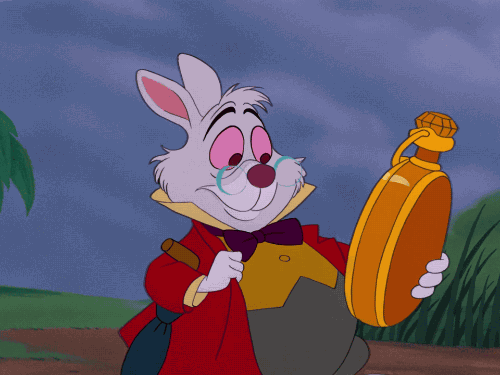
Are you asking if I think Justin could or that he would? I genuinely don't think he would, but he could. The point is that Justin would choose Brian. That was his motivation throughout the series: he chose Brian, and then he had to figure out what that meant. (Justin ditching Brian in season 2 was a poor choice in some ways, but was also clearly a choice that thematically links to their decision not to get married in season 5--loving someone shouldn't cost you yourself.)
Having Justin suddenly be like "ahhh nvm Brian isn't worth it", even offscreen, would be thematically disastrous given the main crux of Brian's issues being that he does not, in fact, think he's worthy of love or even life itself thanks to his dad wishing he was never born.
The ending of season 5 was not that. Justin kept insisting that they would see each other constantly. He still chooses Brian. Brian has doubts because he's still scared, but QAF is always gonna go with the choice and hope option over the fear option.
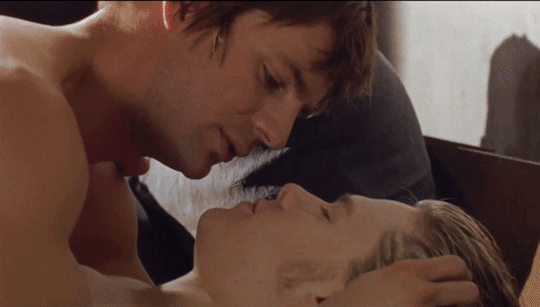
I mean, I've talked multiple times about the ending, but I think the implication is clear--and that was before I found out the writers confirmed that they intended to write them staying together. It's open enough to where people can draw their own conclusions, but I think you have to neglect a ton of context clues and write them off as "random" (when nothing in a story should be random assuming best writing--granted, most stories, even QAF, don't always do this, but it's the general assumption) to come to that conclusion.
I mean, you could conclude that they ended up just as fond memories to each other. But you'd be neglecting a hell of a lot of context, and transporting the story's genre into gritty, even cyclical realism, when it was always more of an optimistic coming-of-age survival story with elements of a fairy tale. (It's not like the story directly called out its fairy tale optimism several times--oh wait it did reference fairy tales, and superhero comic books, and magic, and even had a ghostly apparition in Vic appearing in Brian's dreams.)

Anyways, to conclude that they don't end up together, I think people have to read their own experiences and preferences into the story, which admittedly we all do to an extent, but to a degree where I'd say they're ceasing to view it as a crafted story. I do think the authorial intent was clear.
Why did the narrative specifically call out Brian not returning the rings?
Why was the pattern of every single relationship in season 5 separating, but then coming back together even when things looked impossible (Melanie and Lindsay, Blake and Ted, Emmett and whoever that was, Hunter with Ben and Michael)?
What about the motif of home between Justin and Brian that got multiple shout-outs in every season? (I need to write a meta about this!)
Why did the story talk consistently in almost every season about Brian's life goal being moving to New York? (The thing is, Brian shouldn't move to New York out of fear or because he has no other options. That's not the message of QAF. It should be his choice, and I think it was set up to likely be precisely that.)
Season 4, imo, sets up the ending for us. Justin's about to fly back to Hollywood, but he still waits at the finish line to see Brian (who lags behind everyone else). Michael helps Brian, but Brian almost gives up just in sight of the finish line--until he sees Justin waiting for him. Then, he gathers himself and pushes across the line. The metaphor was so on the nose. Yeah, Justin will then leave for a bit, just like he will at the end of season 5, but Brian will keep moving forward for him. And as if the writers wanted to assuage our fears brought by their very own theme of "you don't know what tomorrow brings; all we have is the present," they included ghostly Vic appearing in Brian's dreams in the finale of season 4 promising Brian that he'd have a "lot more" years left. They'll get there.
So, I think Justin's love for Brian was a choice--one everything about his character and the show's themes demonstrate he'll continue to make.
#ask hamliet#britin#brian kinney#justin taylor#queer as folk us#queer as folk#queer as folk meta#qaf meta#qaf ending#qaf 5x13#brian x justin#britin meta
53 notes
·
View notes